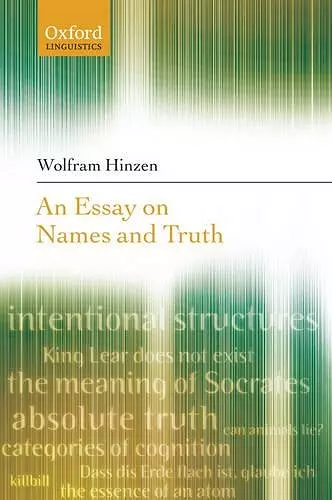An Essay on Names and Truth
Exploring the relationship between language, meaning, and cognition
Format:Paperback
Publisher:Oxford University Press
Published:11th Oct '07
Currently unavailable, and unfortunately no date known when it will be back
This paperback is available in another edition too:
- Hardback£165.00(9780199274420)

This insightful book redefines the concepts of reference and truth, emphasizing the role of the human mind in shaping our understanding of language and meaning.
In An Essay on Names and Truth, Wolfram Hinzen presents a groundbreaking exploration of reference and truth through the lens of Noam Chomsky's Minimalist Program. The author argues that truth is fundamentally a function of the human mind, setting the stage for an internalist reconstruction of meaning. By examining the inherent structures of the mind, Hinzen delves into how humans relate to the world, emphasizing that our understanding of truth is deeply intertwined with our cognitive processes.
Hinzen begins by outlining the essentials of the Minimalist Program, highlighting the significance of linguistic interfaces with other cognitive systems. He posits that meaning is derived from concepts that arise from intentional relations rather than from direct reference to the world. This perspective challenges conventional views, suggesting that our ability to refer is contingent upon the concepts we possess, rather than the other way around. The implications of this argument extend to various aspects of language, including declarative sentences and names, which are often seen as contrary to his approach.
An Essay on Names and Truth makes significant contributions to the fields of linguistics, philosophy, and cognitive science. The author's arguments are framed in a manner that is accessible to scholars and advanced students alike, fostering a deeper understanding of the intricate relationship between language, thought, and truth. This pioneering work invites readers to reconsider established notions and engage with the complexities of meaning and reference in human language.
...a well-structured, well written book... * Georg Ki*cll, The Journal of Lingustics *
In Minimal Mind Design, Wolfram Hinzen laid out the philosophical foundations of a minimalist naturalization of meaning. Most philosophers would have been satisfied with that important contribution; Hinzen took it as a mere first step. In this sequel, he embarks on a far-reaching program, aiming at rethinking the old chestnuts of concepts, names and truth within a radically Chomskyan paradigm. I simply do not know of any other work of this scope and profoundness that is as well-versed on current syntactic theorizing. * Juan Uriagereka, Professor of Linguistics, The University of Maryland at College Park *
The book marks a signal step in the evolution of generative grammar and the unification of mind and brain. It should command the attention of linguists, philosophers, psychologists and the field of cognitive science. * Tom Roeper, University of Massachusetts, Amherst *
...a book like Hinzen's is welcome... * Ileana Paul and Robert J. Stainton, Mind *
In this finely crafted essay Hinzen argues that quintessentially semantic notions like Truth and Reference are in fact deeply grounded in natural language syntax. This is nothing less than the beginning of a Copernican revolution in philosophy of language and mind. This should be on everyone's required reading list. * Cedric Boeckx, Harvard University *
ISBN: 9780199226528
Dimensions: 233mm x 157mm x 15mm
Weight: 398g
254 pages